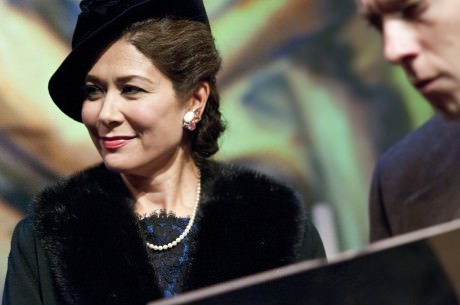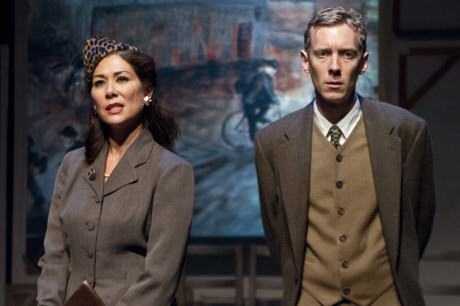In Part 2 of a series of interviews with the cast of The Pitmen Painters, we meet MiRan Powell.

Joel: Why did you want to become a member of the cast of this production at 1st Stage?
MiRan: I didn’t know anything about the play and started as a reader because Jane Kalbfeld, the casting director professed to need help. Little did I know that she actually thought I would be perfect for the role, but knowing it was an ‘historical’, or in other words, Caucasian play, she didn’t directly invite me to audition. But Stevie was very open to me, invited me to the callback and the rest is history. Mark, the artistic director, and Jane, have always been strong proponents of non-traditional casting. This is the 3rd show where I’ve played a character that would traditionally have been played by a Caucasian actress, so I’m very grateful to them and open-minded directors. It truly felt like a miracle when Jane called me at home with the news.
Introduce us to your character and how you relate to her
I play Helen Sutherland. The Helen Sutherland of history and the Helen Sutherland of the play are really very different people, and once I was cast, the effort to be perfectly true to the historical Helen seemed unnecessary and not what the playwright had written anyway. As with all people who are extremely privileged, Helen has idiosyncrasies and expectations that are unique to her social class.She is a British heiress, divorced, no children, and truly interested in living a purposeful life while enjoying her privileges. She’s basically a diva, and that comes naturally for me, but I do know where she lives and breathes. I understand her point of view.
What do you admire most about Helen and what do you not admire about her?
I admire Helen’s generosity, her gentility, her ability to see Oliver’s potential, her desire to help and be edified herself in the process. I don’t admire her innate sense that the coal miners need to be elevated to create art and to ultimately, be equal to her social set, or that she really has little sense of their suffering in the end. After all, if she really wanted to, she could have given Oliver another chance, but the moment had passed.
What is the play about from Helen’s point of view?
To me, the play is certainly about “class and isolation” as Stevie originally said to us, but for Helen, it’s also about how the fear of success is just as damaging as the fear of failure. Oliver really could have had a different life, and it wasn’t a sellout; it was simply meeting opportunity with open arms, having the courage to define oneself by opportunity, not the past or bloodline. It’s the American Dream. It’s what Hollywood is made of. I think she saw that his mind was equal to hers, and that was very intriguing and refreshing on many levels, that he would dare to disagree with her, challenge her views, and ultimately, reject her in a way that became very personal to her.
How did you prepare to play Helen?
I love research. It really connects the dots for my characters, fleshes them out more completely than just analyzing the text. I learned more about the real Helen, who her husband was, what life was really like at Rock Hall, etc. and have enjoyed reading the biography of British shipping heiress Nancy Cunard who was about 15 years younger than the real Helen, as well as the lovely book Cafe Society, which is about the relationship of heiresses to their patrons from about 1900 -1950 when Hollywood became the new ruling class in terms of fashion, art, etc. If I were to be true to the real Helen, I would have had to play her older and more matronly so that the possibility of sexual tension did not exist. What I found in my research fully supported what I feel is the play’s Helen, or my Helen anyway.
What has been your experience with art and painting and how did this experience help you prepare for your role?
I have some understanding of music and dance, but not the visual arts. I feel rather deficient in this way. My mother-in-law was an artist, so I borrowed some of her college books to help me with terminology. Stevie advised me to really connect Helen’s views of the art to the art and not herself in the art. This was helpful in removing myself emotionally from the content to give her critiques more substance even though it sort of flies in the face of her explanation of the meaning of art as “something that happens, in your heart, in your mind…” The real Helen was quite serious about art and expected the coal miners to be able to explain why they did what they did.
What scene is the most challenging to master and why? And which scene that you are not in moves you the most when you watch it?
The hardest scene and most problematic is Helen’s last scene with Oliver because, she is giving an art critique, but I always felt that she was talking more personally. The language is very charged sexually to me. It is emotional – unless you take that out of the equation by how you cast. So…trying to find the balance between what was true and what was personal – trying to justify why she would use such harsh, pointed, personal language as her final advice didn’t jive with a narcissistic, shallow woman, or even a woman who still wanted to help Oliver improve his technique – that opportunity was already gone really. If Oliver wasn’t special, if she could find a half dozen just like him to transform into a Ben Nicholson, why not just cut her losses, why not just say, ‘it’s all very nice dear; have a good life’. But she doesn’t. I’ts not that she gives him a frank opinion, it’s how she does it, the choice of words. It also comes shortly after the rejection scene. She even admits to being “slightly bitter.” But personally, very personally, I feel she was touched by Oliver in a spiritual way, she truly saw beyond the “superficial differences” between them, saw what he could become, felt a connection as she says in the garden: “I see something of myself in you”. Finding the balance in this scene and throughout the play really, between my instincts and the director’s vision is what makes acting a collaborative process.
As for scenes that I’m not in, I never really got to see many, so I can’t say. I will say that my two scenes in Act 2 were the most moving to me because of the pathos I felt in Oliver’s words. Who doesn’t know what it feels like to ” not have the language” at some time in our lives? That helplessness, the humility and at the same time pride in who you are – it’s so moving, so endearing. It makes the last scene very hard to play because Helen seems to be intentionally hurting him in a profound way. Who talks like that in real life? And to someone of the opposite sex who is not in the same social class? “There is no sexuality in your paintings…one doesn’t feel desire in the work at all…” OW!
What have you learned about art, artists, mining and painting that you didn’t know before you were hired for this production?
I certainly feel a great admiration for these coal miners, for the purity of their conservative values, their desire to better themselves, to reach into the light after spending their days in the dark beneath the earth. Not being so inclined myself, I find it interesting that they found such freedom in this type of expression. I’ll forever make stick figures, but all of these miners found the inspiration to make the ordinary, extraordinary.
What is your favorite line from the play that you recite and what is your favorite line than another character recites and why are they your favorites?
I don’t recite it, but I will…

Helen: “Don’t be pathetic. I am throwing you a lifeline here.” – the ultimate in superior thinking.
Oliver: “We’re from a different country, man.” – well put!
What do you want audiences to take with them after seeing you perform in The Pitmen Painters?
I hope audiences will continue to ponder the question of “Who gets to create art?” and how does social class define what we value, admire, aspire to, or condone?
The Pitmen Painters plays through October 13, 2013 at 1st Stage Theatre – 1524 Spring Hill Road, in McLean, VA. For tickets, order them online.
LINK
Meet The Cast of 1st Stage’s ‘The Pitmen Painters’ Part 1: James Miller by Joel Markowitz.






Great cast
Great story –
Immensely enjoyed.